‘Art for Social Change’: Positive experience in Latvia inspires Swede to coach young refugees in Norrköping
After 10 years of travelling around the world and more than 20 years working in Latvia, Carl is today drawing on his experience to positively influence the lives of 235 teenagers from 20 different nationalities who have newly arrived in Sweden.
Carl experienced first-hand the collapse of the Soviet Union shortly after he established himself in Riga. In the early 90s, the capital of Latvia was a hive of cultural activity and Carl decided to settle there. Based in Riga, he spent the next 10 years travelling around the world making documentaries, until he moved to Liepāja, the third largest city in Latvia. Following the fall of the Soviet Union, Liepāja changed from a military city into a modern port city. Together with some artists, Carl opened a culture centre and lived there another 10 years, a dream that lasted until 2008, when the crisis hit Latvia hard. Carl vividly recounts those years as a very productive time, when he had the opportunity to help very poor children between six and 18 years old: “Art for social change” was our main motto. Cultural activities let them express their identity and 20 years later I can still interact with them on Facebook and see the positive changes in their lives”, says Carl. Photography workshops, drawing lessons, theatre classes or renovating buildings were some of the activities in Liepāja. “It is all within the creative process, like theatre, where you break barriers and you start speaking as mankind”, he adds.
Back in Sweden, Carl started to teach Swedish to 68 students at Kungsgård High School in Norrköping, in October 2013. Today, in close collaboration with his 15 colleagues, he takes care of 235 asylum-seekers and refugees from 20 different nationalities, with newcomers arriving almost every week, especially from the Syrian Arab Republic, Afghanistan, Somalia and Eritrea. “Språkintro” is a governmental programme available to all asylum-seekers and refugees in Sweden between 16 and 19 years old and its main goal is to help them learn Swedish. Amongst his responsibilities, Carl ensures the students have access to sports clubs, theatre and singing lessons, but also helps with practical info like how to borrow books in public libraries and better integrate into the local communities. For all that, learning the language is essential: “I always keep in mind lessons learnt in Latvia. A good command of Latvian or Swedish is basic to become part of the society. For me it took two years to be more or less fluent in Latvian, and then everything changed and my efforts were very much appreciated.”
After living in several countries for almost 30 years, Carl considers motivation as the key to make a change. “There are many things in common between Latvia and Sweden, like the passion for theatre and for singing. The wild nature and the calmness. But there is something even more similar between the kids I worked with in Latvia and the ones I am coaching in Norrköping, and that is the enthusiasm for learning and being part of the society. My mission as an integration coach is to motivate them and find the way for them to channel their enormous potential”, he says with a passionate gaze.
Carl is now organizing a series of concerts and performances in June that will give these school pupils the opportunity to share their talent with more than 3.000 students from Norrköping. “And this is just the beginning. Inclusion is a two-way process where everyone gains.”
Page 3 of 4
-
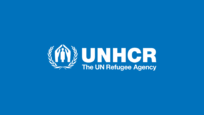
UNHCR law observations on Latvian declaration of emergency situation
25.10.2021UNHCR, the UN Refugee Agency, has submitted its observations on the Declaration of Emergency Situation (No 518) by the Latvian Cabinet of Ministers. UNHCR’s Representation for the Nordic and Baltic Countries has submitted its observations to the Latvian Ministry of the Interior on the Order No 518 on the Declaration […]
-

UNHCR urges States to end stalemate at Belarus-EU border and avoid further loss of life
22.10.2021UNHCR, the UN Refugee Agency, is appealing for urgent action to save lives and prevent further suffering at the border areas between Belarus and the European Union (Latvia, Lithuania, Poland) after the latest tragic death of an asylum-seeker was reported this week. This is now the eighth death to be […]
-

UNHCR and IOM shocked and dismayed by deaths near Belarus-Poland border
21.09.2021Joint UNHCR/IOM Press Release
-
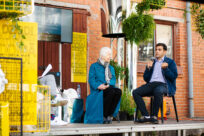
“I completely decided that this is my country”
17.09.2021Syrian Aladin, who fled his country to Latvia, discussed identity, home and belonging with Lalita, who fled her home country Latvia during World War II.
-
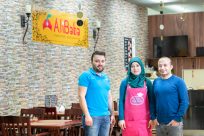
UNHCR: Despite some remaining challenges, refugees still optimistic about their future in the Baltic countries
09.06.2021Estonia, Latvia and Lithuania are countries where refugees can thrive, not just survive. UNHCR survey reveals willingness of refugees to start a new life and integrate in the society, but also remaining challenges.
-

UNHCR welcomes Latvia’s decision to grant automatic citizenship at birth to children of “non-citizens”
07.11.2019UNHCR welcomes the fact that Latvia’s Parliament has adopted legislative changes that will entitle children born after 1 January 2020 to parents who are considered “non-citizens” under the law to automatic Latvian citizenship at birth.
-
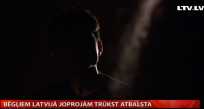
Refugees in Latvia still in lack of support
30.01.2018 -
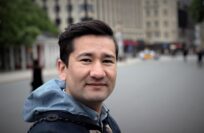
“Hamid. The Refugee who stayed.”
29.10.2017While many refugees and asylum-seekers are leaving Latvia to go to other EU countries, Hamid who is from Afghanistan calls Latvia his home and has applied for Latvian citizenship.
-
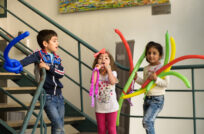
Openness. Humanity. Security: World Refugee Day 2017 in Riga
22.06.2017World Refugee in Riga: stories, virtual excursions and delicious Middle Eastern food.
-
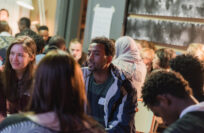
Living Library in Riga: Stories as means for promoting understanding
20.04.2017“What matters is that they all have something to say, and that we can use conversation to erase the artificially constructed boundaries between ‘us’ and ‘them’ in order to see what unites us all”
